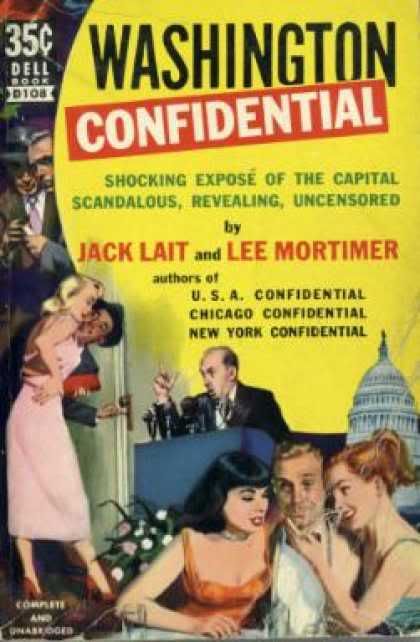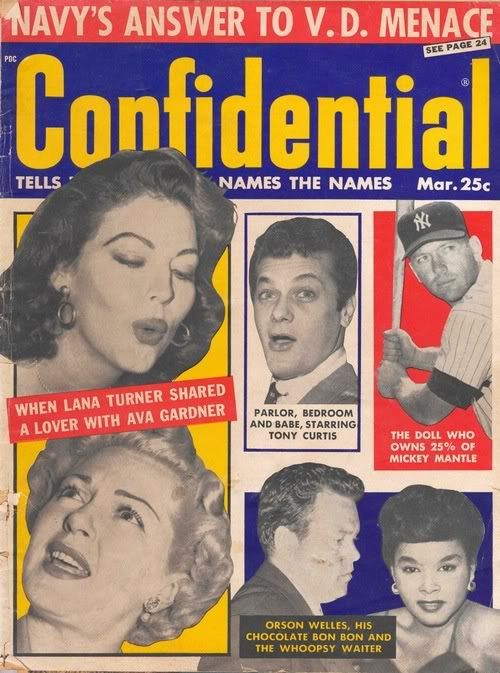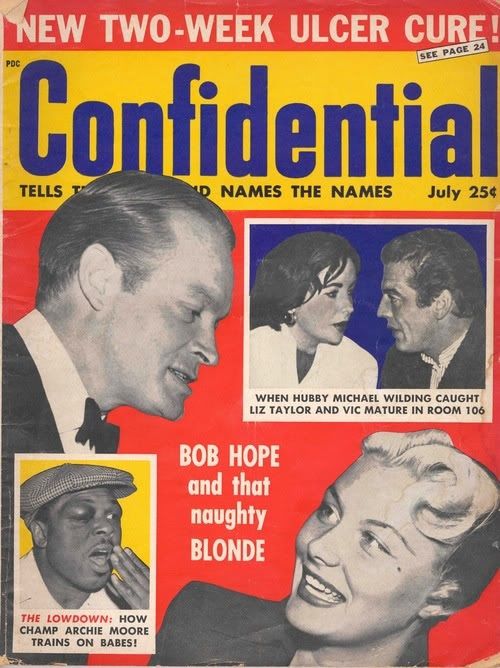

Wikipedia said:
"Confidential was a periodical published quarterly from December 1952 to August 1953, and then bi-monthly until 1978. It was founded by Robert Harrison and is considered a pioneer in scandal, gossip, and exposé journalism. Newsweek said it featured 'sin and sex with a seasoning of right wing politics'.
Its journalism consisted just as much of innuendo as of exposés. For example, the magazine alleged that Bing Crosby was a wife beater and that Rock Hudson and Liberace were homosexuals ('Lavender Lads'), and made public the fact that Robert Mitchum had been charged with smoking marijuana. Apart from spreading gossip and outing homosexuals, Confidential combined its exposés with a conservative agenda especially targeted at those who sympathized with the political left and at celebrities that it claimed were engaged in inter-racial affairs.
Humphrey Bogart described its popularity: 'Everybody reads it but they say the cook brought it into the house.'
Confidential's technique for the writing of an article was also innovative. In 1955 Time described the journalistic approach: 'By sprinkling grains of fact into a cheesecake of innuendo, detraction and plain smut, Confidential creates the illusion of reporting the 'lowdown' on celebrities. Its standard method: dig up one sensational ‘fact’ and embroider it for 1,500 to 2,000 words. If the subject thinks of suing, he may quickly realize that the fact is true, even if the embroidery is not. […] The magazine specializes in finding one black mark in a subject's distant past, and hammering him with it...'
The first issue was published in 1952 under the headline "The Lid is Off!". Under the slogan "Tells the Facts and Names the Names" Confidential soon became the fastest growing magazine in the U.S. After only a couple of issues the magazine claimed its circulation was four million copies. As each copy was reckoned to be read by ten persons this meant that the publication reached every fifth American if Confidential's own figures were accurate). Robert Harrison was estimated to make half a million dollars per issue.
By July 1955, TIME was decrying Confidential's success: 'In a little more than two years, a 25¢ magazine called Confidential, based on the proposition that millions like to wallow in scurrility, has become the biggest newsstand seller in the U.S. Newsmen have called Confidential ('Tells the Facts and Names the Names') everything from "scrawling on privy walls' to a 'sewer sheet of supercharged sex.' But with each bimonthly issue, printed on cheap paper and crammed with splashy pictures, Confidential's sale has grown even faster than its journalistic reputation has fallen.'
Due to Confidential's success, and the large amount of revenue it generated, competing magazines soon were created – Hush-Hush, Uncensored, Naked Truth, Rave, Private Affairs, Revealed, Side Street, Exposed, The Lowdown, Exclusive, Blast, Inside, On the Q.T. All of these magazines had striking slogans in the Confidential tradition: "Uncensored And Off The Record", "What You Don’t Know About The People You Know", "Stories The Newspapers Won’t Print!", “All The Facts...All The Names”. Even Confidential recycled their own articles in Whisper, one of Robert Harrison’s other publications."

The Washington City Paper said:
"Jack Lait and Lee Mortimer were a couple of New York City newspapermen who had the chutzpah in 1951 to publish a book, Washington Confidential (*), that promised the 'low-down on the big town.' The writers had earlier published Chicago Confidential, which, according to the dust jacket for WC, 'was viciously attacked and vilified by public officials, notables and literary critics all over the country.'
The fact that Lait and Mortimer's publisher, Crown, thought such information might help sell the new book said a lot about everyone involved. It said they were way ahead of their time in understanding that scandal and hyperbole sell so much better than facts and reason."


Gawker.com said:
"In the new book Shocking True Story, Henry E. Scott details the rise and fall of Confidential magazine which was the TMZ of 1950s Hollywood sleaze. We have an excerpt. And Scott was nice enough to scan some covers.
The magazine, in stripping away layer upon layer of Hollywood puffery, left a legacy of skepticism and cynicism that was quickly embraced by Americans who had come to doubt the oh-so-wholesome image of life they saw projected endlessly on the silver screen.
Although Confidential eventually fell, it spawned dozens of imitators, some of which continue to prosper. In many ways, Confidential was father to the National Enquirer, the Star, E! True Hollywood Story, Access Hollywood, TMZ.com, and for that matter, today's Vanity Fair. Confidential was, in a sense, inevitable. 'Half-fictionalized as they are,' said Camille Paglia, the feminist social critic who grew up reading Confidential, 'the tabloids, with their twin themes of sex and violence, tell the lurid pagan truth about life.' As Robert Harrison put it, 'I sincerely believe the basic vehicle of the story-behind-the-story will be here long after we are all dead.'"
See more here: http://gawker.com/5454839/when-gossip-was-gritty-confidential-magazine
Beltway Confidential, Los Angeles Confidential and now... Forum Confidential.

Links:
http://en.wikipedia.org/wiki/Confidential_(magazine)
http://www.washingtoncitypaper.com/blogs/youngandhungry/2010/06/29/washington-confidential-on-d-c-dining-and-nightlife-circa-1950s/
http://gawker.com/5454839/when-gossip-was-gritty-confidential-magazine
http://blog.chron.com/beltwayconfidential/
http://la-confidential-magazine.com/
http://slconfidential.blogspot.com
Brethren:
ReplyDelete"The interview was resurfaced shortly after Guido Fawkes, a UK political blogger who describes his posts as "Tittle Tattle, gossip and rumours," published what he said was "vocal and written confessions" that Morgan published hacked stories."
http://www.msnbc.msn.com/id/43907072/ns/world_news-europe/?gt1=43001
http://order-order.com/
http://order-order.com/2011/07/27/piers-de-resistance/
http://zelo-street.blogspot.com/2011/07/guido-fawked-no-research-no-result.html
"Intentions
ReplyDeleteThe primary motivation for the creation of the blog was purely to make mischief at the expense of politicians and for the author’s own self-gratification. At the time most political blogs, from the author’s viewpoint, were earnest and serious. His intention was to create a more fun, gossipy and acerbic “anti-politics” form of commentary. Never having suffered from a lack of intellectual confidence, the adoption of tabloid news values was not embarrassing or accidental, it was a deliberate and necessary step towards becoming popular. The British blogosphere was at that time full of wannabee Telegraph and Guardian leader writers and a lot of “Fisking” – the tedious line-by-line critique of long boring articles in the form of an even longer, even more boring article.
Inspirations
Guido set out to be sensationalist, Matt Drudge was an inspiration, Kelvin Mackenzie’s Sun of the 80s was another. The camp, politically incorrect tone of the media/music/culture/whatever website, Popbitch, is deliberately echoed. When media pundit Roy Greenslade described Guido’s blog as “the bastard love-child of Popbitch and Kelvin Mackenzie”, Guido was proud of his parentage. Madame Popbitch herself contacted Guido to say she was proud of her offspring.
Perception
Guido sees himself as a journalist, a campaigning journalist who publishes via a website. He campaigns against political sleaze and hypocrisy. He doesn’t believe in impartiality nor pretend to it."
http://order-order.com/2004/01/09/about-guidos-blog/
"Frequently Asked Questions:
ReplyDeleteWhy is it written in the third person? “Guido was.. Guido understands… Guido this, that and the other?”
It is because he is “in character”. Many newspaper diarists use the same device. Guido is not an individual. At home Guido says “may I have the butter” on the blog however…
Do you delete comments you disagree with?
Sometimes the feeling of absolute power is just too good to resist, particularly if they have spent ages writing an essay of a comment. Mainly comments from bores and obsessives get deleted. Off-topic comments get deleted as well. The comments policy is arbitrary and inconsistent. Bear in mind hundreds of thousands of comments get made every year. There is a vague ad hominem offensiveness level that merits deletion as well, by and large that level is different for public figures than private figures. Thousands of comments attacking Guido are still on the blog. Witty ones in particular don’t get deleted. Some people are just outright banned and their comments disappear as soon as seen. The policy is inconsistent because Guido doesn’t like to pre-moderate comments. Obviously comments that risk libel writs also get deleted. Guido has more than enough writ threats of his own to deal with. Any kind of reference to Guido’s family or alter egos are deleted without hesitation. Mrs Fawkes insisted on that after a particularly bad stalker incident.
This blog is private property, not a public commons, readers are guests. Guido is a believer in freedom of speech and suggests you exercise it by starting your own blog."
http://order-order.com/2004/01/09/about-guidos-blog/